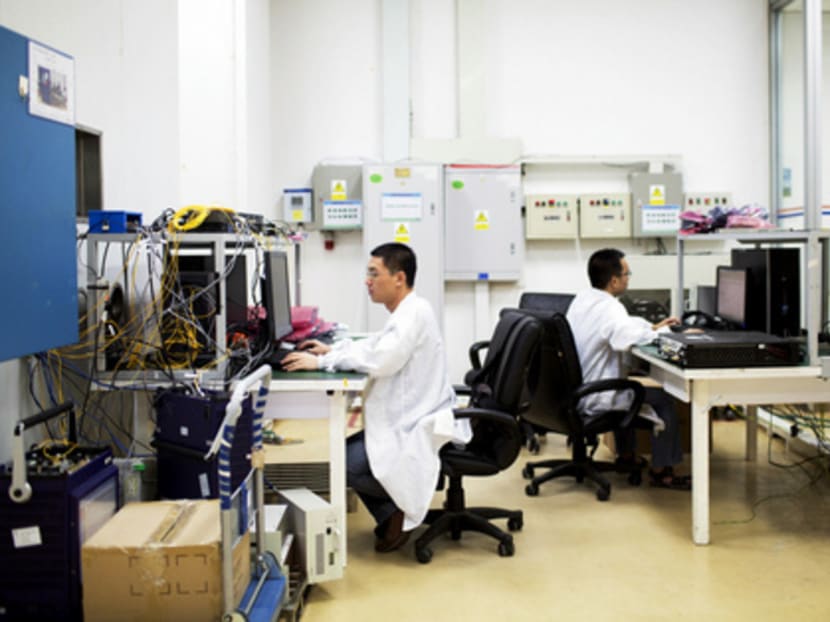China moves to replace foreign hardware, software with its own
BEIJING — China is aiming to purge most foreign technology from banks, the military, state-owned enterprises and key government agencies by 2020, stepping up efforts to shift to Chinese suppliers.

Engineers working at the global compliance and testing centre at Huawei Technologies’ campus in Shenzhen. Chinese firms such as Huawei have begun to gain local market share at foreign rivals’ expense. Photo: Bloomberg
BEIJING — China is aiming to purge most foreign technology from banks, the military, state-owned enterprises and key government agencies by 2020, stepping up efforts to shift to Chinese suppliers.
The push comes after a test of domestic alternatives in the north-eastern city of Siping that was deemed a success, said people familiar with the matter. Workers there replaced Microsoft’s Windows with NeoKylin, a homegrown operating system, and swapped foreign servers for ones made by China’s Inspur Group, they said.
The plan for changes in four segments of the economy is driven by national security concerns and marks an increasingly determined move away from foreign suppliers under President Xi Jinping. The campaign could have lasting consequences for United States companies including Cisco Systems, International Business Machines, Intel and Hewlett-Packard.
“The shift is real,” said Mr Charlie Dai, a Beijing-based analyst for Forrester Research. “We have seen emerging cases of replacing foreign products at all layers from application, middleware down to the infrastructure software and hardware.”
China is moving to bolster its technology sector after Edward Snowden revealed widespread spying by the US National Security Agency and accused the intelligence service of hacking into the computers of Tsinghua University, one of the China’s top research centres. In February, Mr Xi called for faster development of the industry at the first meeting of his Internet security panel.
Foreign suppliers may be able to avoid replacement if they share their core technology or give China’s security inspectors access to their products, the people said. The technology may then be seen as safe and controllable, they said.
The push to develop local suppliers comes as Chinese regulators have pursued antitrust probes against Western companies, including Microsoft and Qualcomm. Recent months have seen Microsoft’s China offices raided, Windows 8 banned from government computers and Apple iPads excluded from procurement lists.
“I see a trade war happening. This could get ugly fast, and it has,” said Mr Ray Mota, chief executive officer of ACG Research, who expects the issue to result in direct talks between the US and China. “It’s not going to be a technology discussion. It’s going to be a political discussion.”
In September, the China Banking Regulatory Commission (CBRC) ordered banks and finance agencies to ensure that at least 75 per cent of their computer systems used safe technology by 2019, calling on the financial institutions to dedicate at least 5 per cent of IT budgets towards the goal.
While the CBRC policy does not make a distinction between foreign and domestic products, it says banks must favour companies that share their core knowledge and key technology. It also cautions banks from relying too heavily on one supplier.
Chinese firms, such as Huawei Technologies and ZTE, have already begun to gain local market share at the expense of foreign rivals.
About 80 per cent of banks’ core servers and systems are made by foreign brands, Mr Yan Qingmin, a CBRC vice-chairman, said last month at a conference in Beijing sponsored by news magazine Caijing. “Most of China’s financial IT systems are from foreign countries,” he said. “From the perspective of national security, it poses potential threats to us.”
Chinese firms have faced similar pressure overseas. A 2012 US Congressional report said Huawei and ZTE, the country’s largest phone-equipment makers, provide opportunities for Chinese spies to tamper with US communications networks. Huawei has since been shut out from several US deals.
The orders from Chinese banking and military commissions coincided with the trial of domestic computer systems in Siping, a city of 3.4 million people in Jilin province. Other cities and agencies in Jilin will begin testing whether NeoKylin, a Linux-based operating system from China Standard Software Co, can substitute Windows and servers made by Inspur can replace IBM’s, the two people familiar with the plan said. The trial will then be expanded across the country.
China faces obstacles in replacing foreign software and hardware on a national scale. Almost three decades after paramount leader Deng Xiaoping approved his State Hi-Tech Development Plan, Chinese firms hold a fraction of global market share and are still unable to match the most advanced products, such as high-end bank servers.
“A key government motivation is to bring China up from low-end manufacturing to the high end,” said Ms Kitty Fok, China managing director at market research firm IDC. Bloomberg





